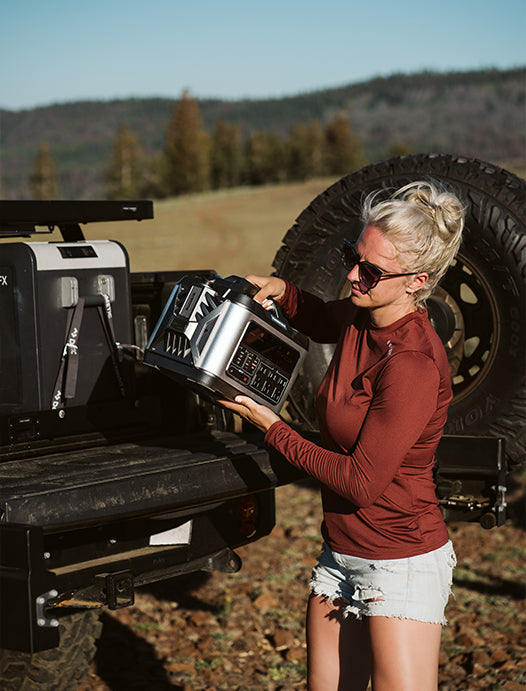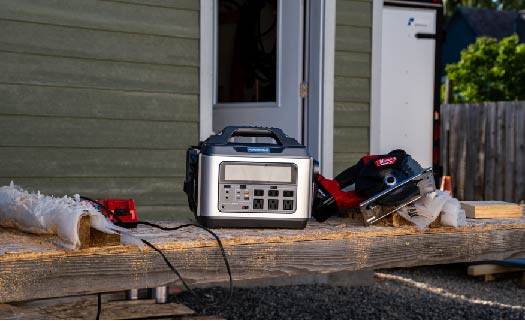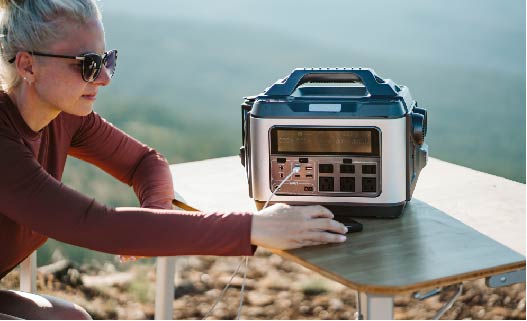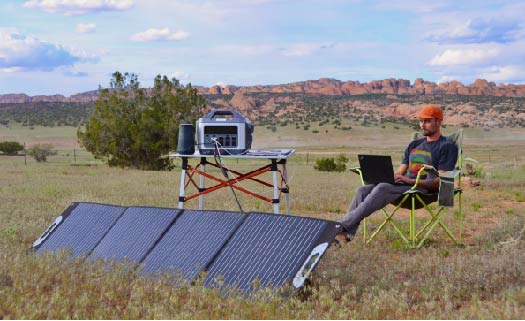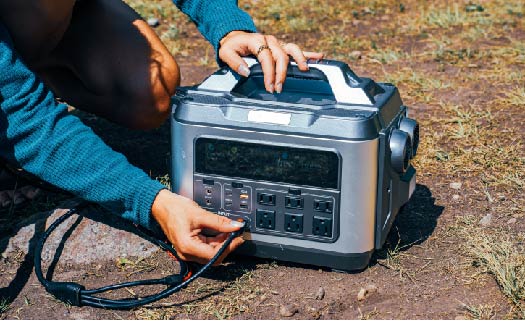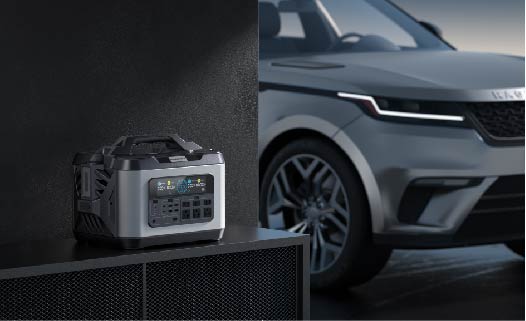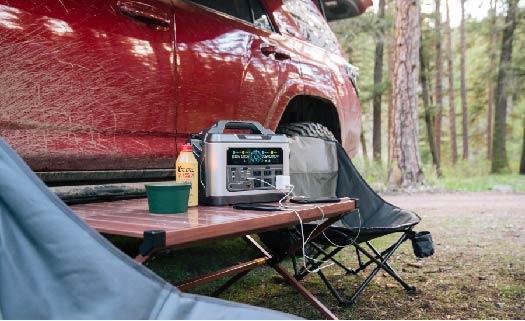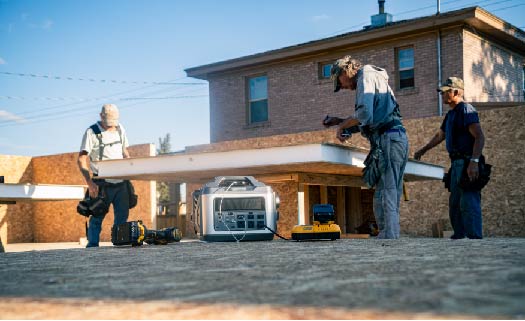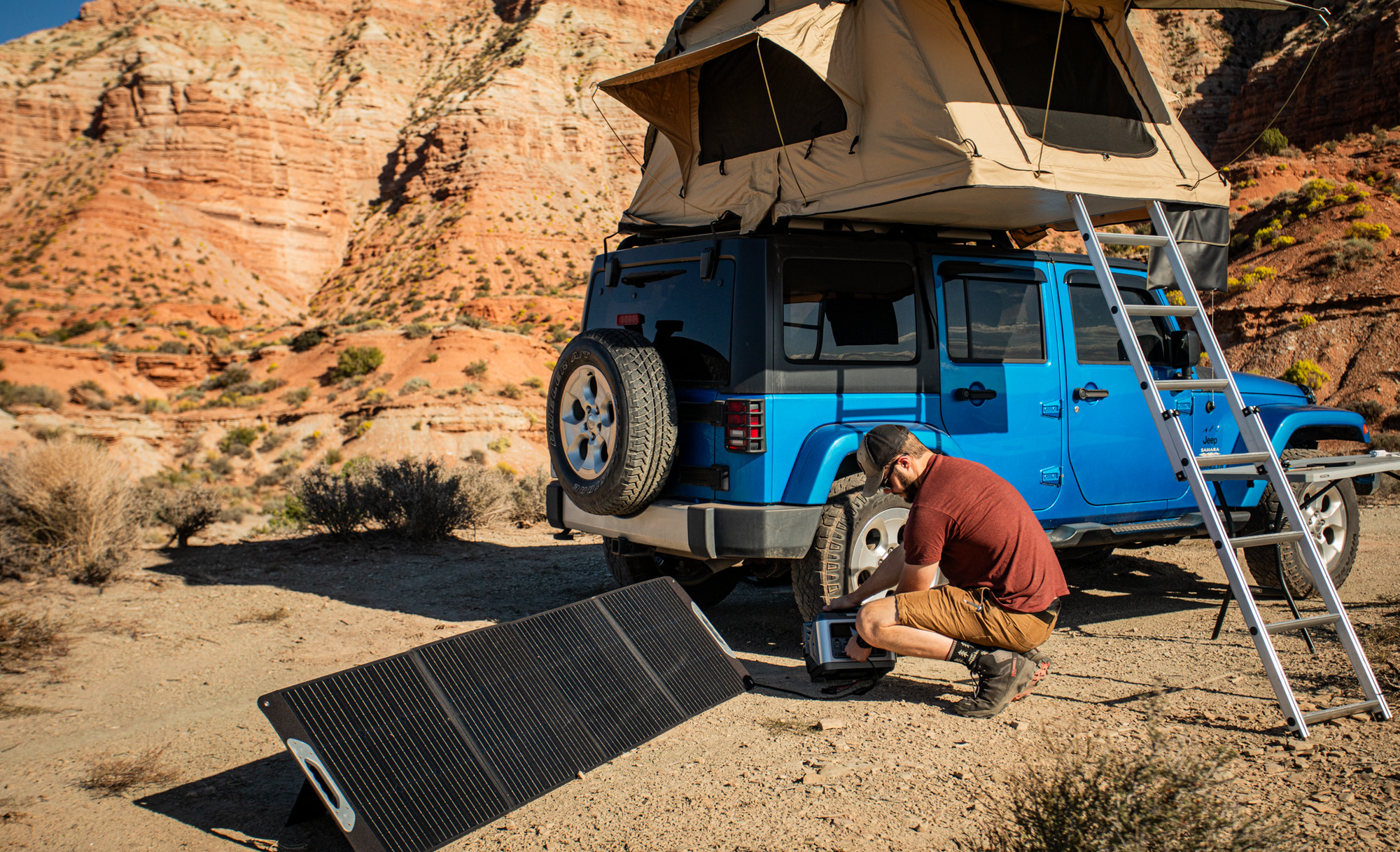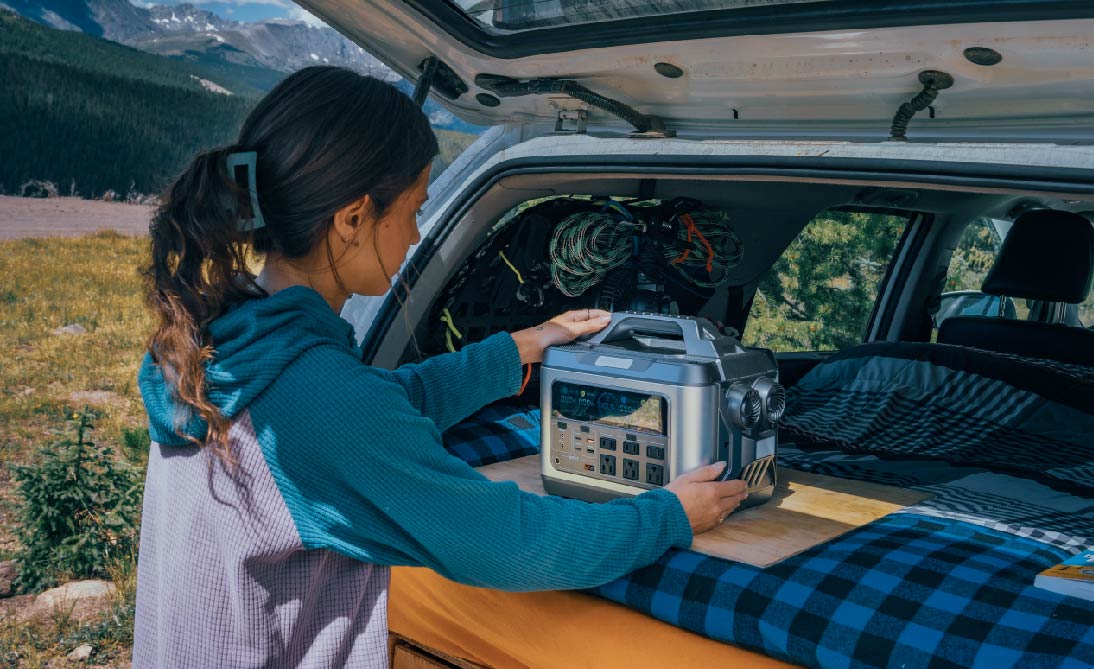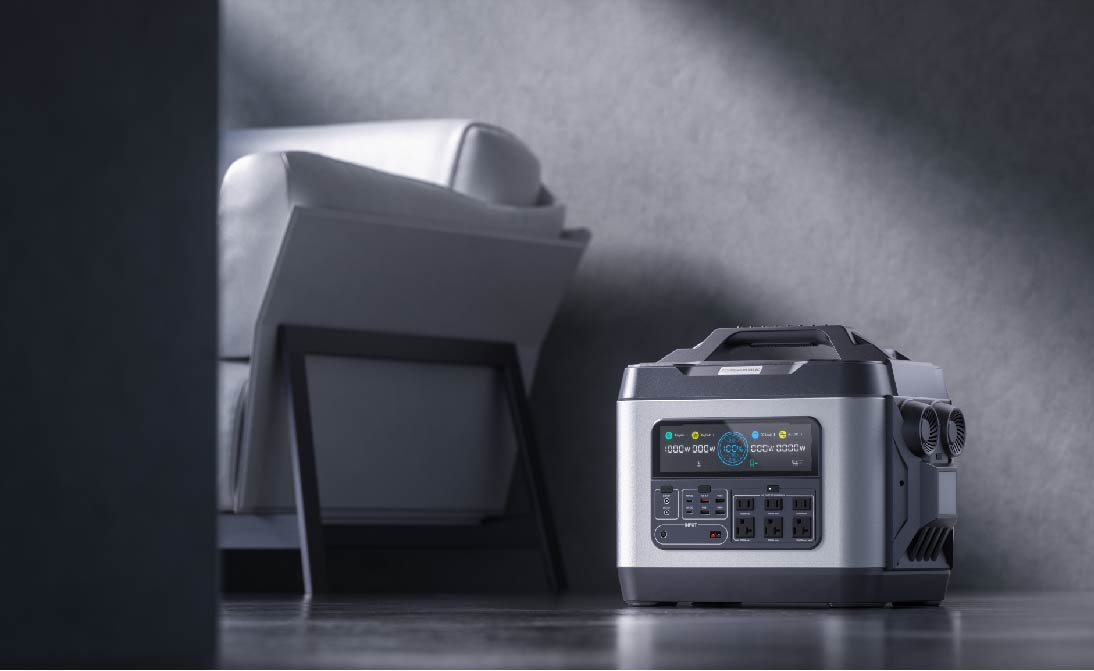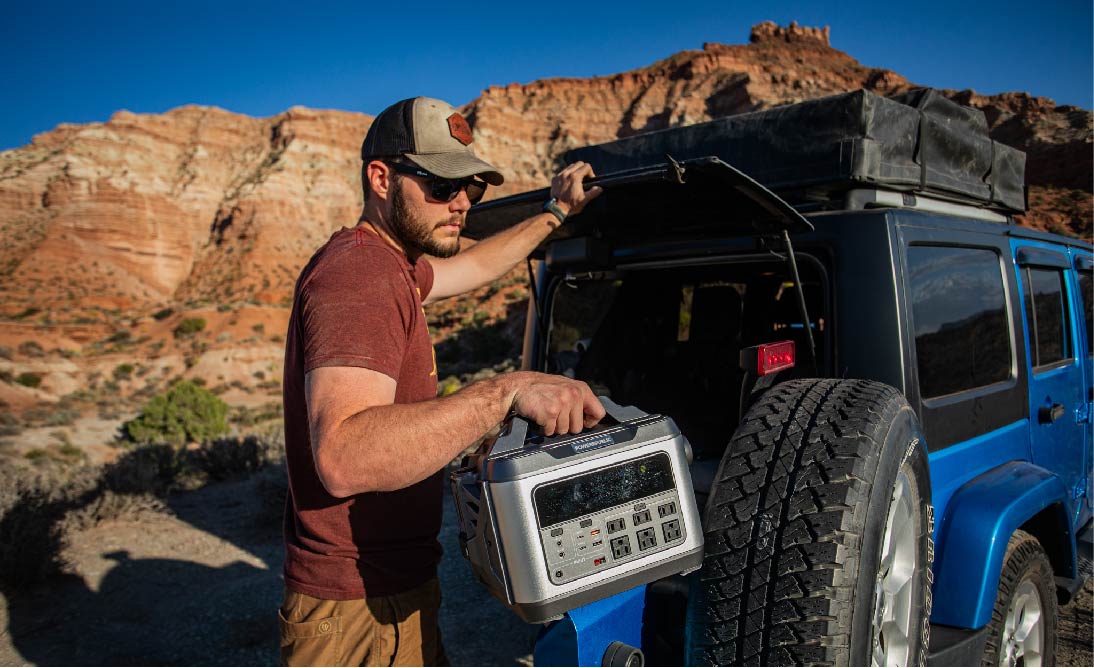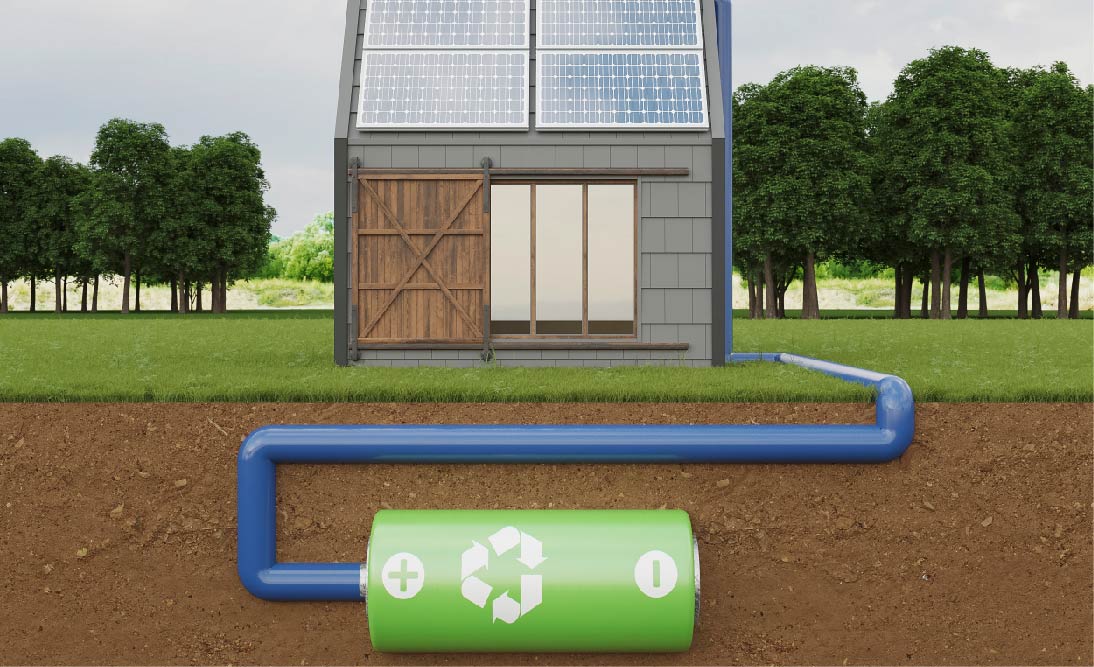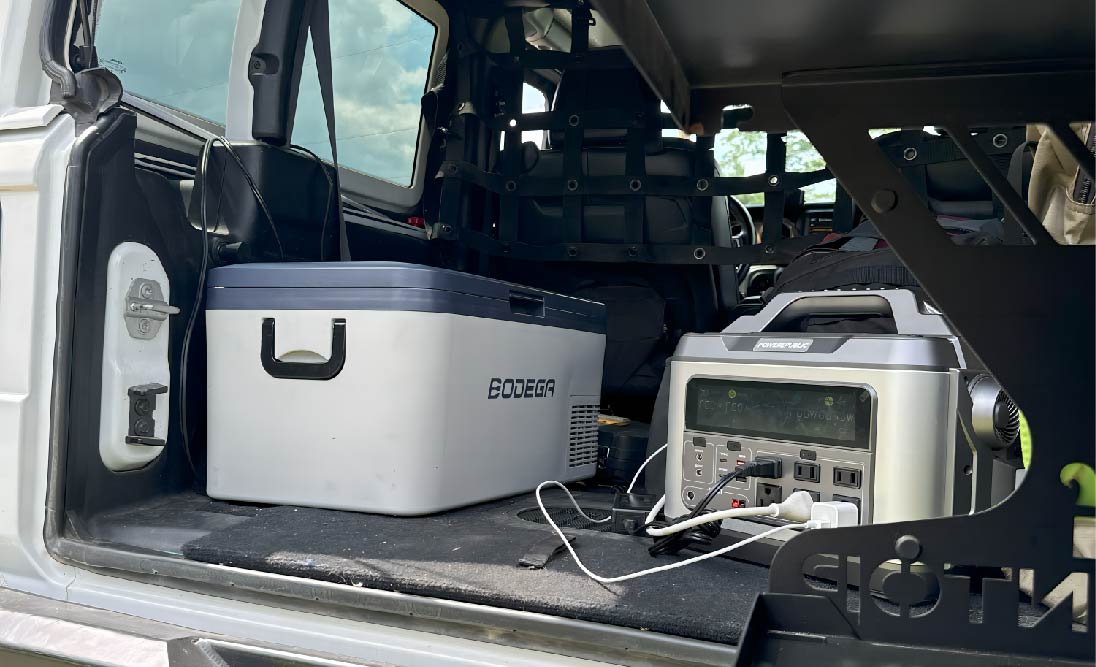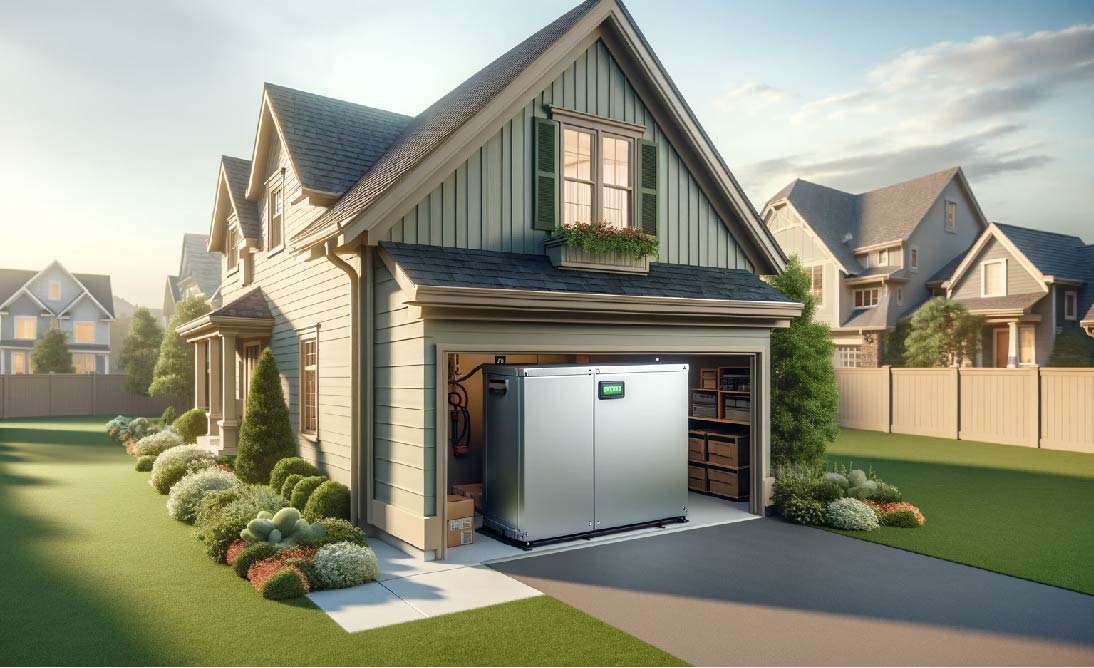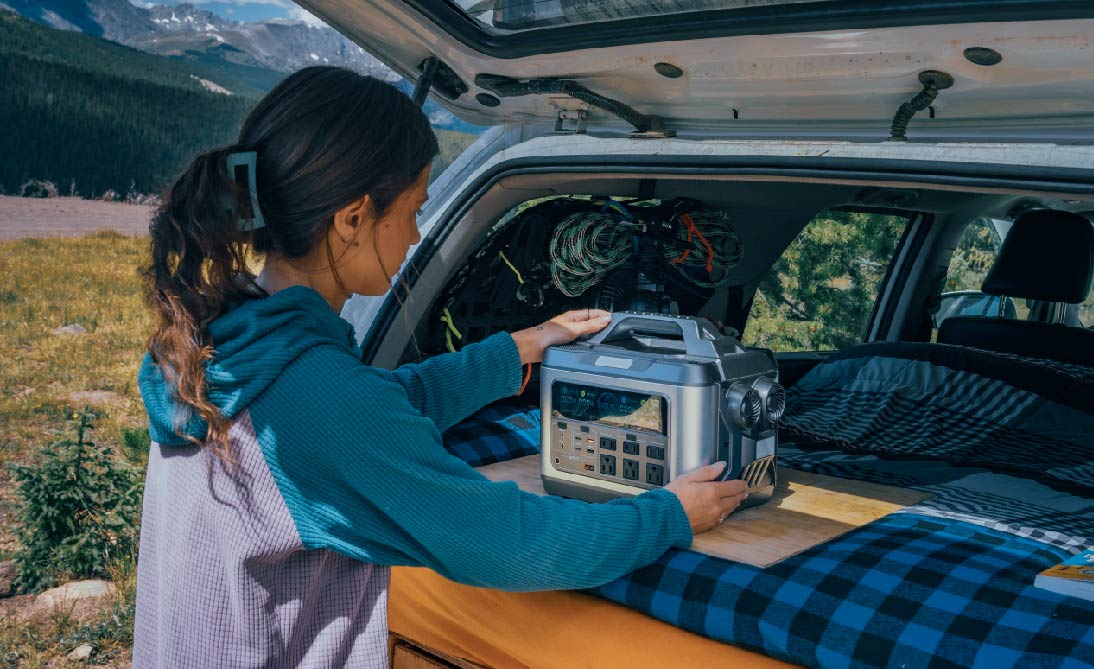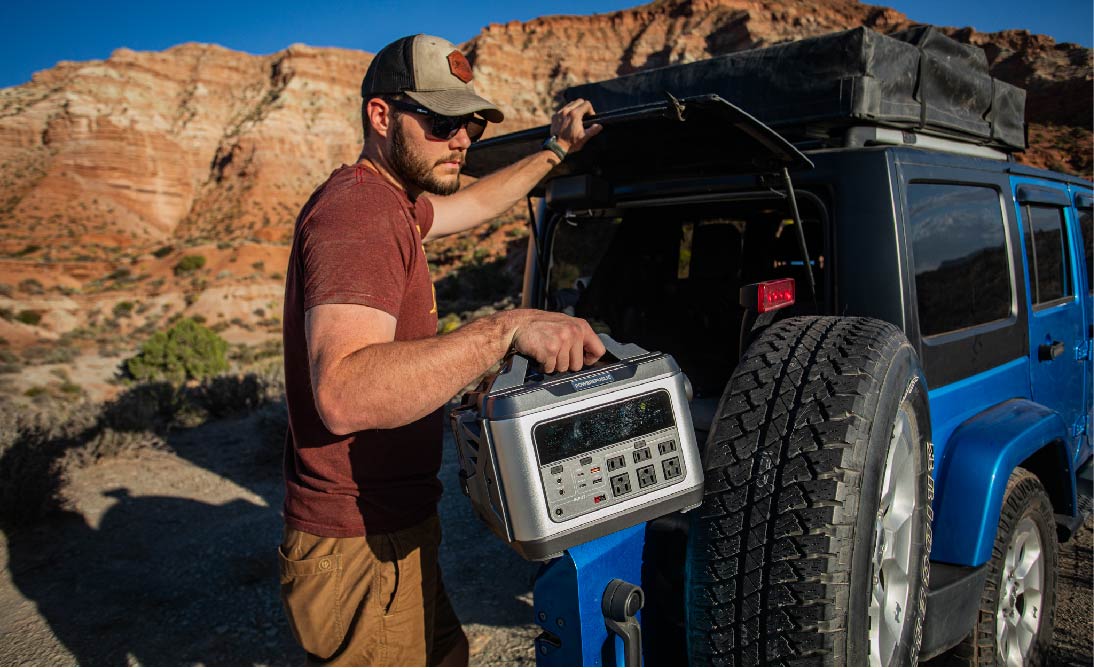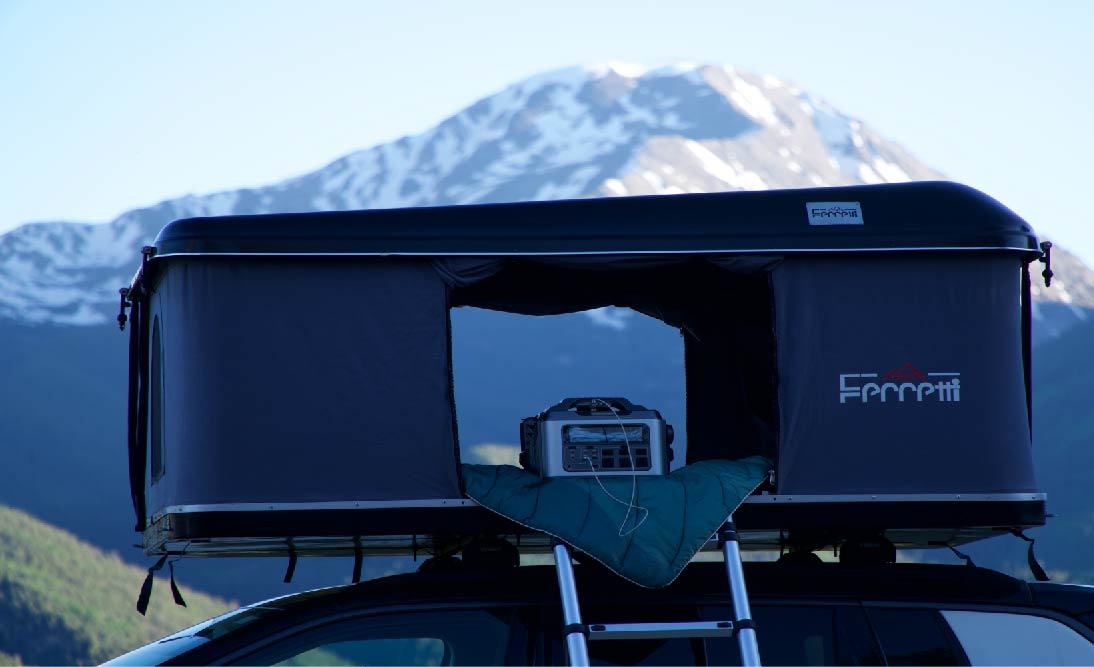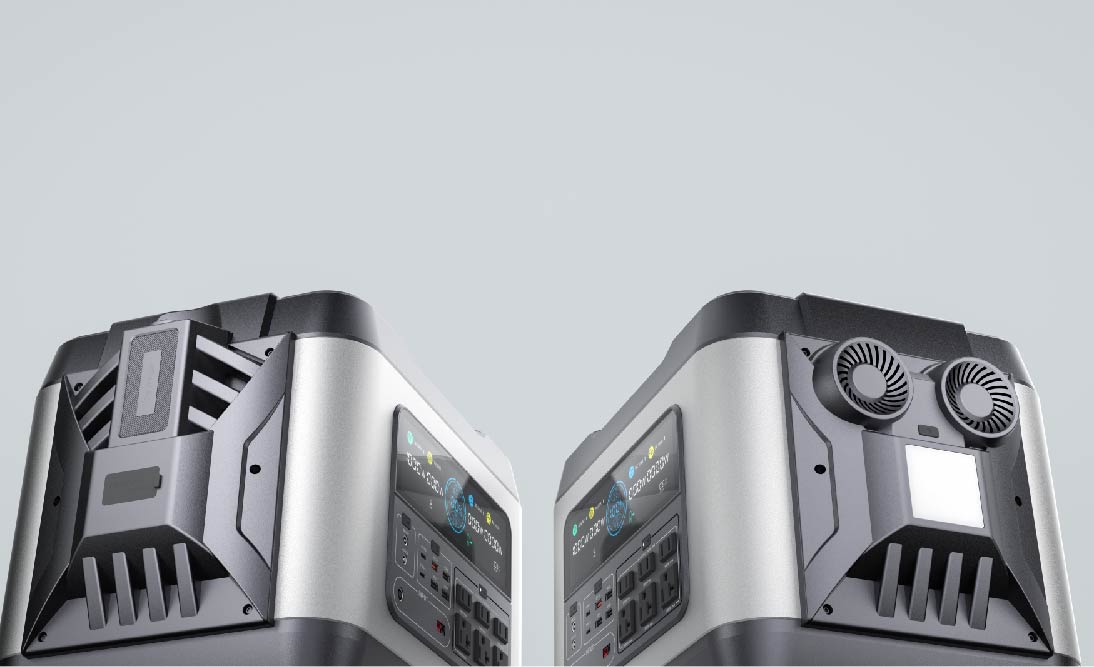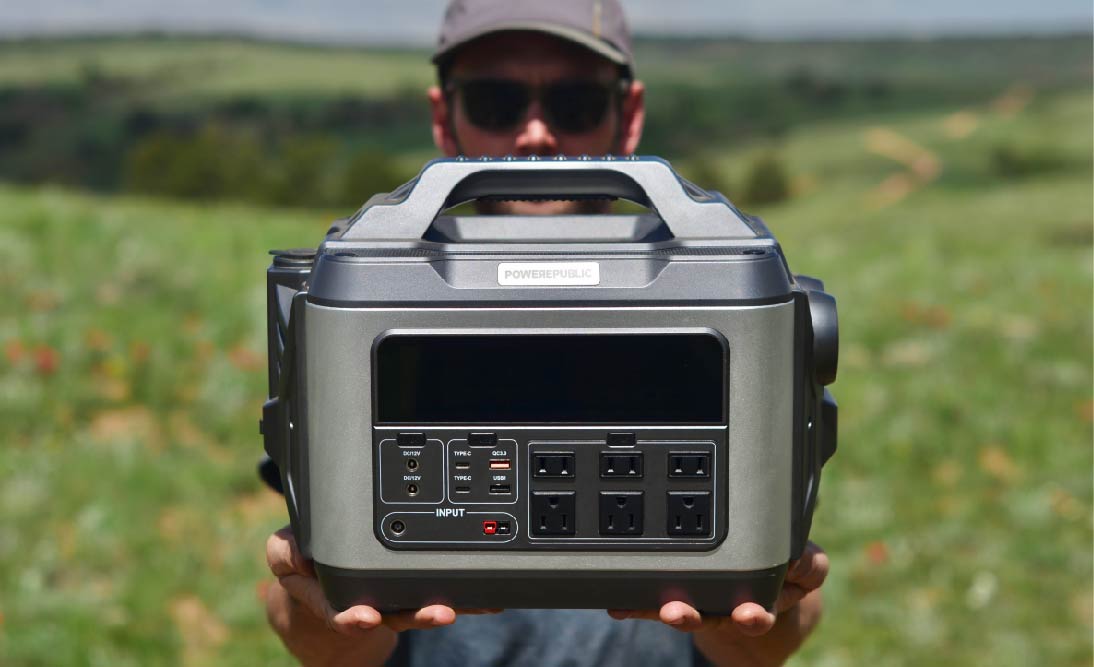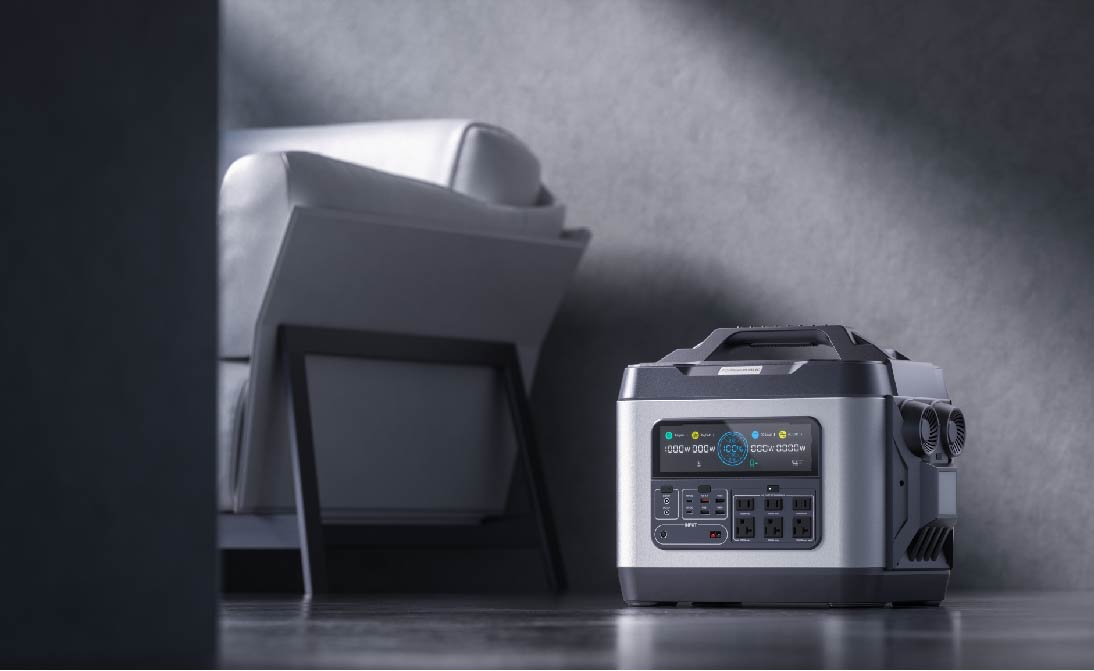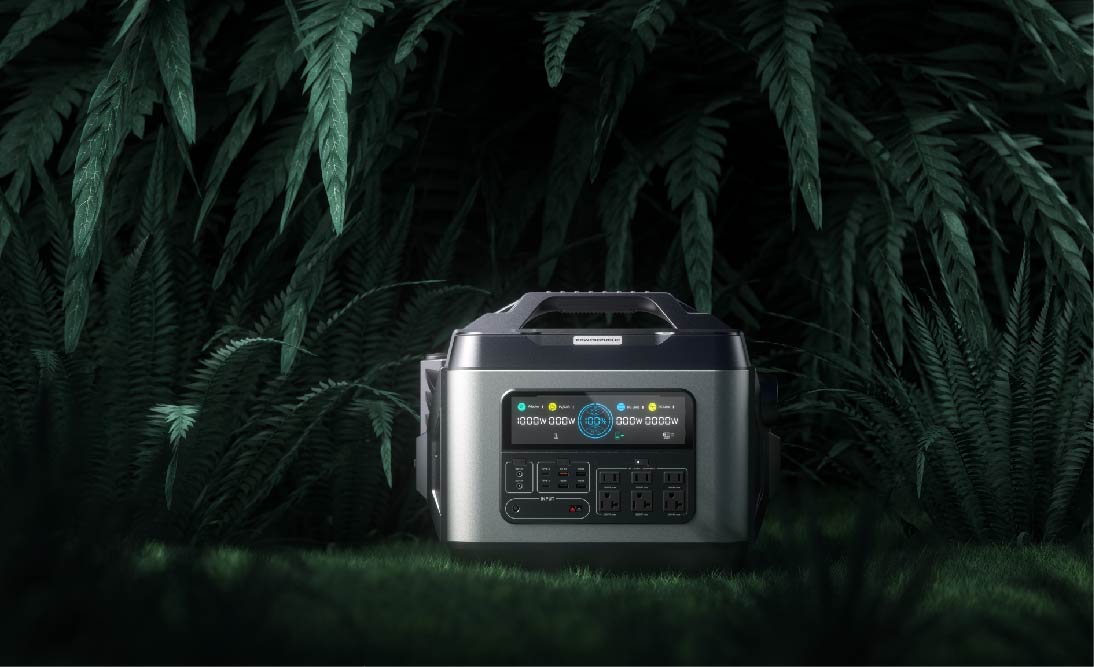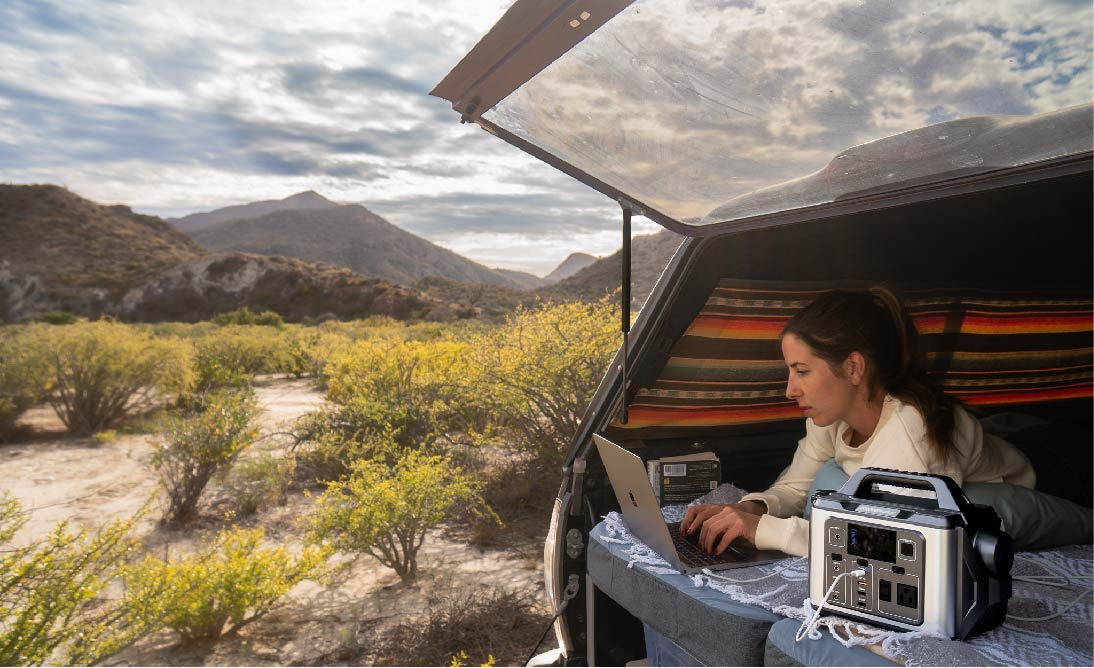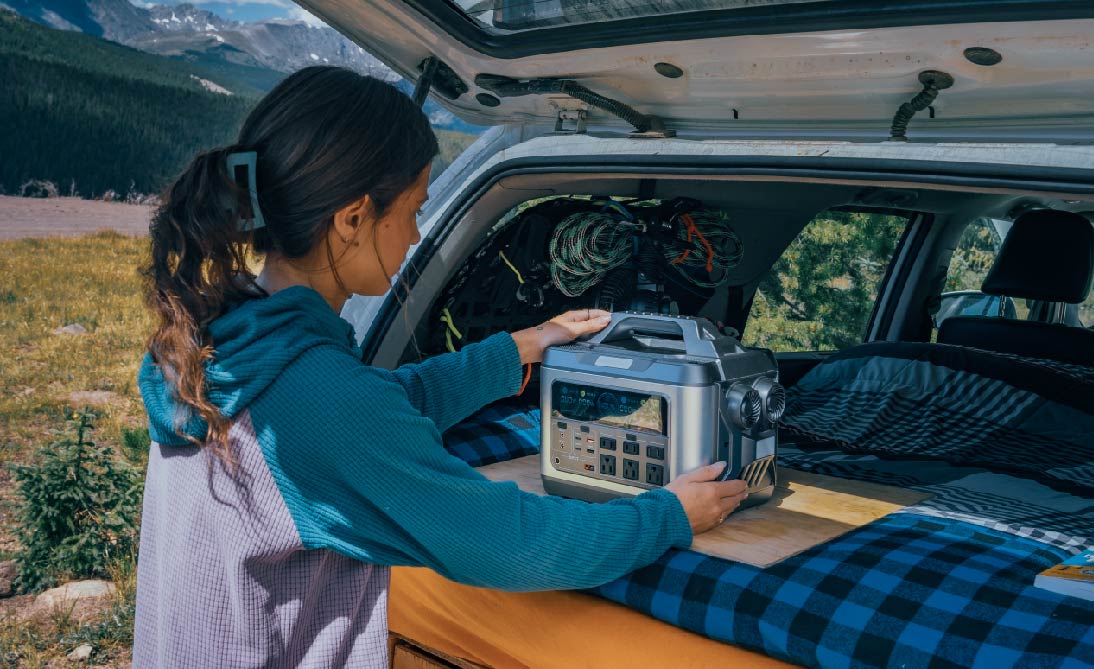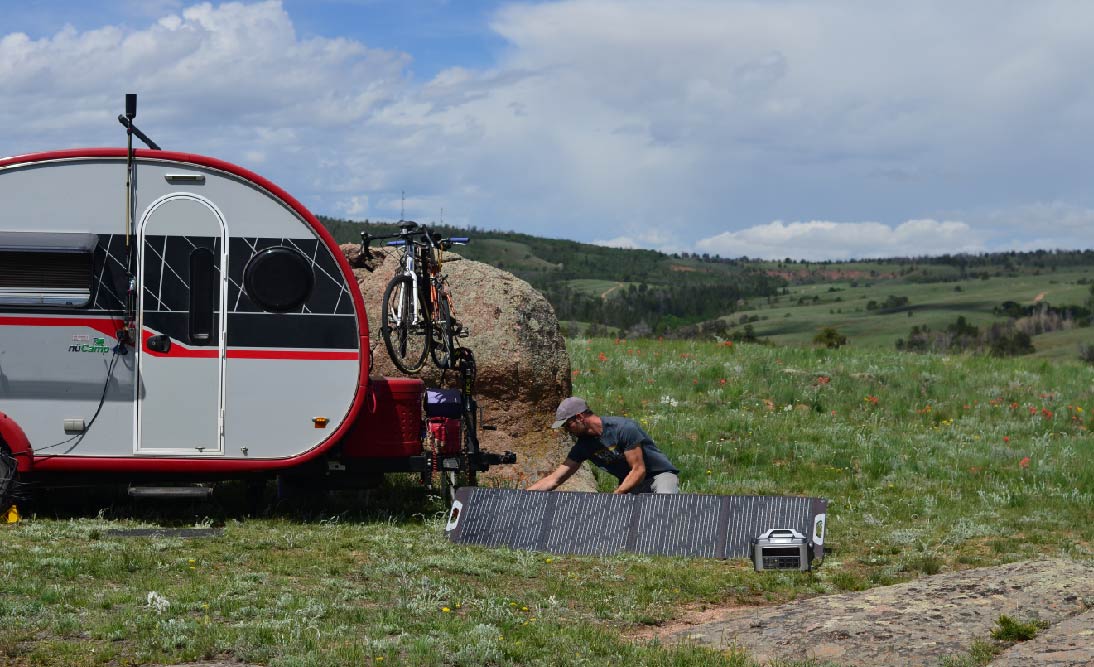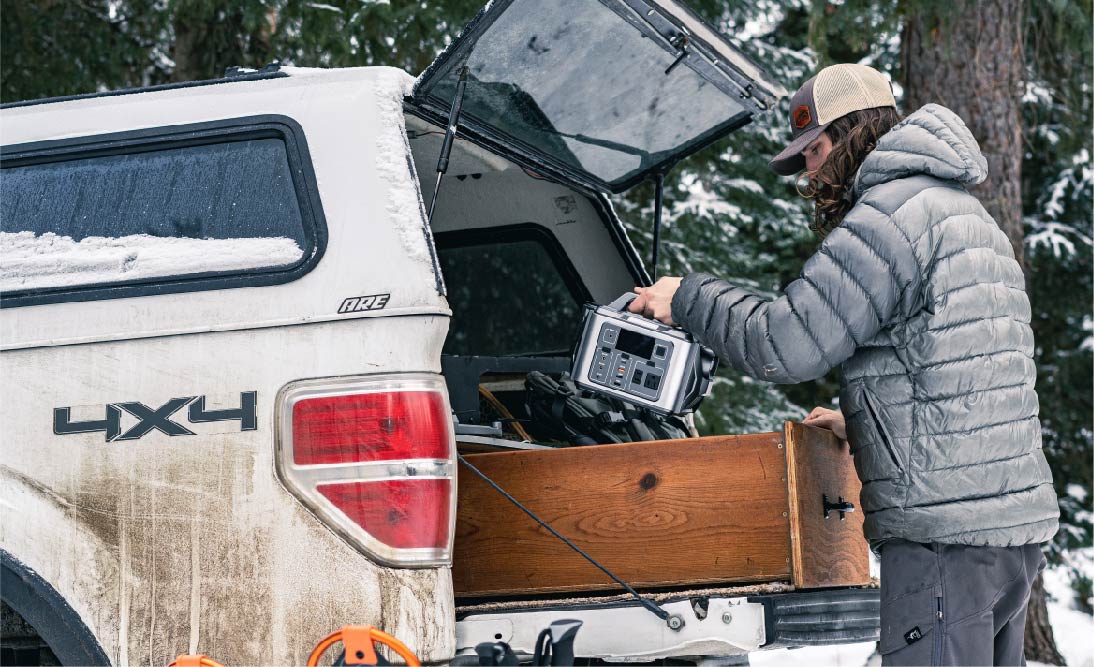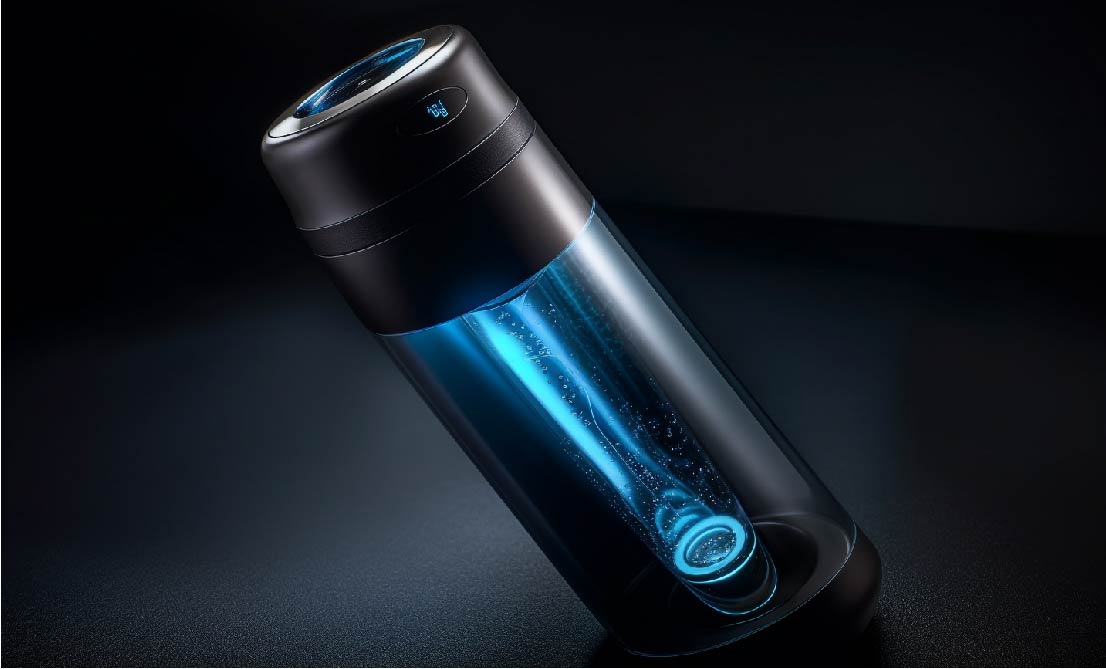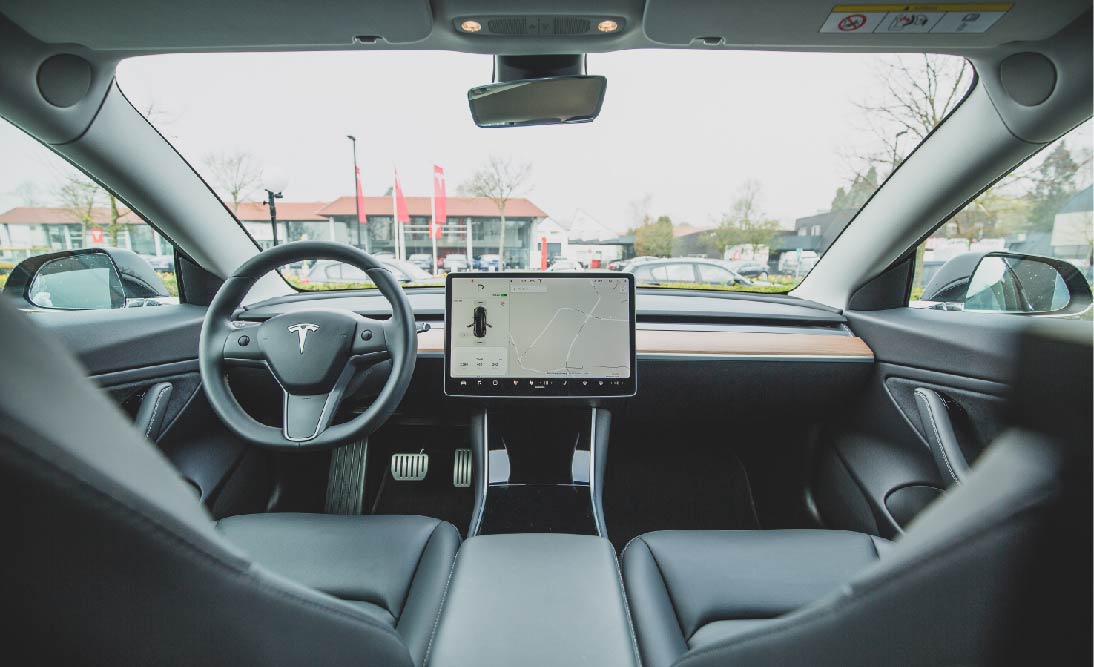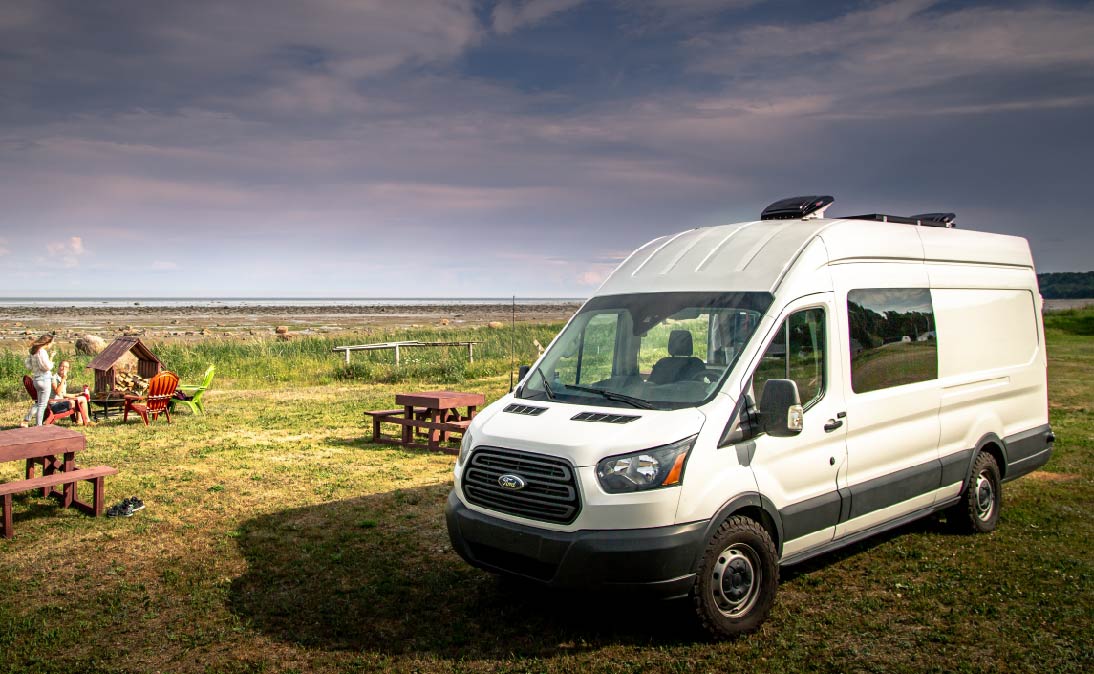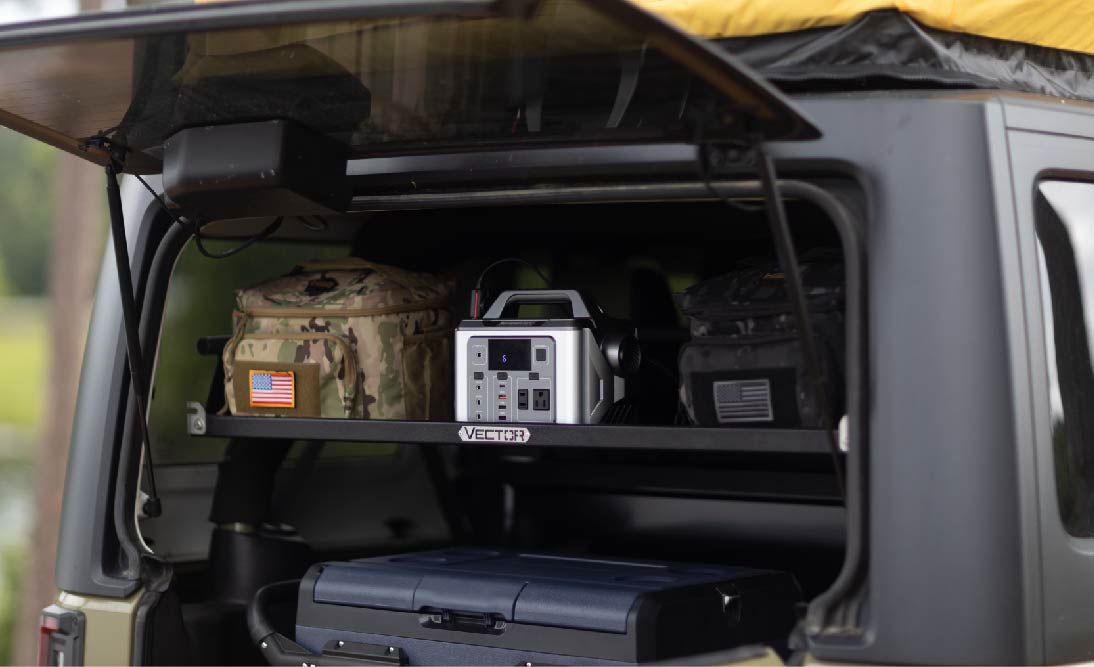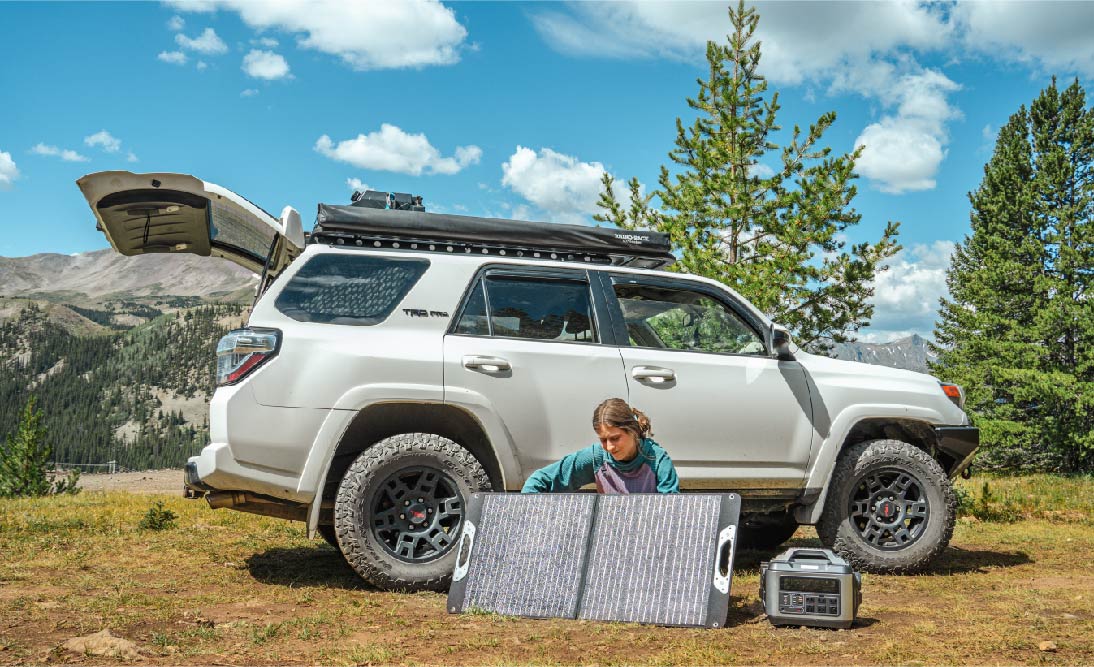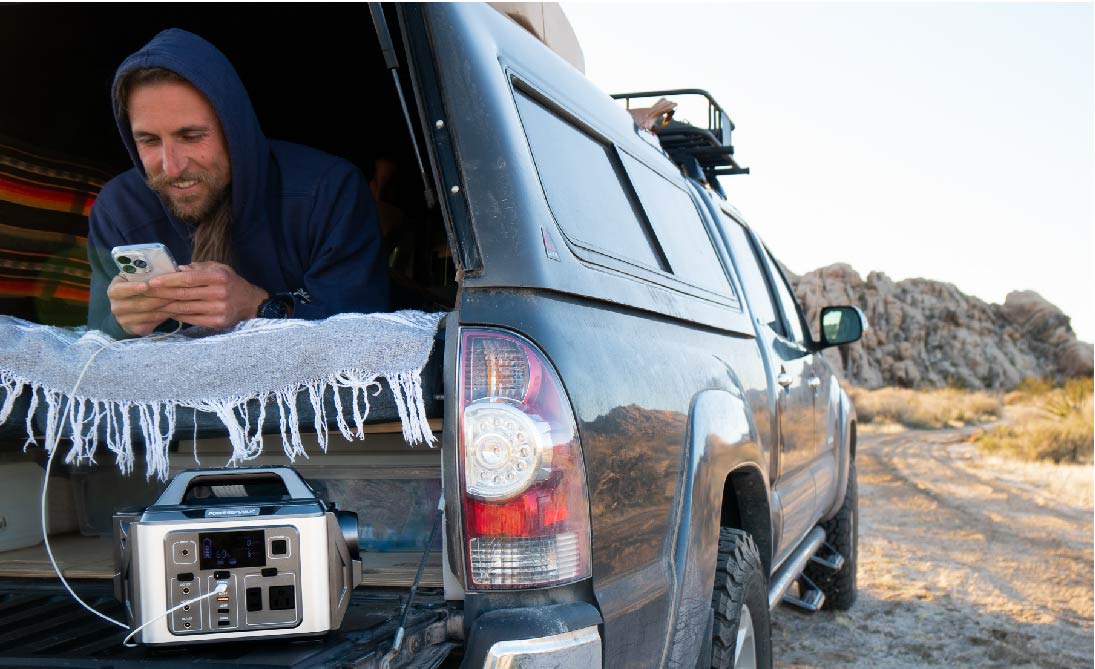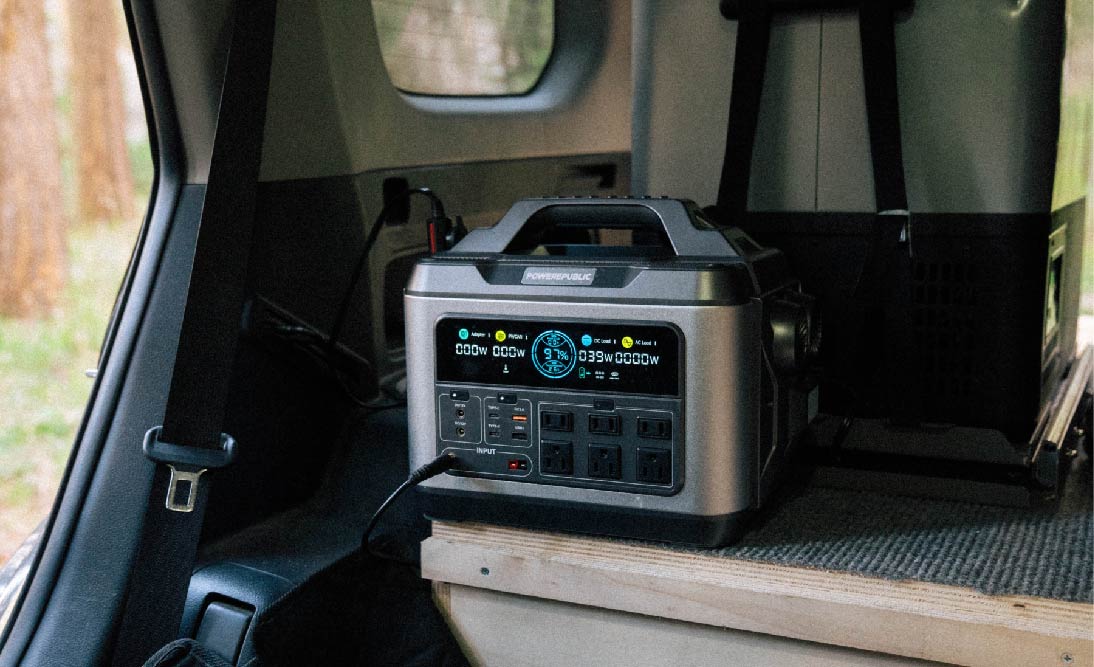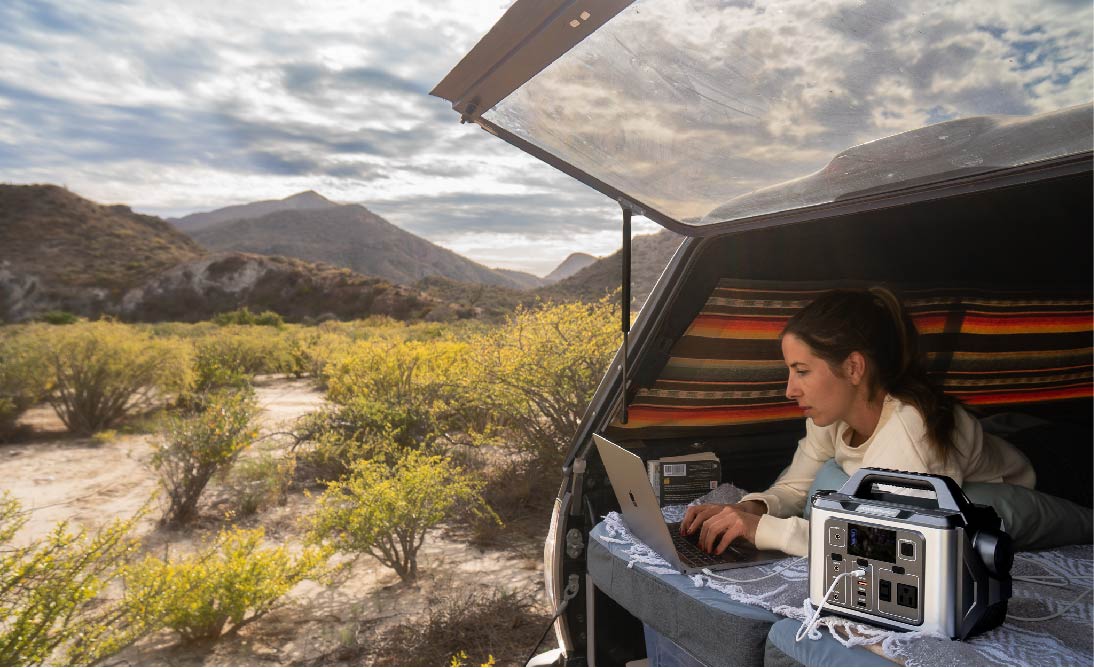Table of Contents:
-
FAQ II: Can I Use a Portable Power Station To Run an Electric Blanket?
-
FAQ III: Can I Bring a Portale Power Station To The Airplane?
Ensuring sufficient power and electricity to keep your food and beverages chilled is crucial, especially while camping in the wilderness. Refrigerators vary in size and power requirements, making it essential to understand the type of refrigerator you need before investing in a portable power station. Portable power stations are known for their reliability as backup power sources during outages. In this blog, we will explore whether a portable power station can effectively run a refrigerator. We hope you'll gain valuable insights from this discussion.
How Does a Portable Power Station Work?

A portable power station is a versatile and mobile energy source, useful for various situations like outdoor activities or as a backup during power outages. Here's a brief explanation followed by a table that outlines its main components and their functions:
How Does a Portable Power Station Work?
A portable power station primarily serves as a large battery, storing electrical energy for later use. It is charged through methods like AC wall outlets, car chargers, or solar panels. Once charged, the power station can convert the stored DC power into AC power, which is the type used by most household appliances and electronic devices. It features various output ports for different devices and ensures a stable and safe power supply.
Here's a table detailing the key components and their functions:
|
Component |
Description |
|
Energy Storage |
A large battery (usually lithium-ion or lithium-polymer) that stores electrical energy for later use. |
|
Charging |
The power station is charged via an AC wall outlet, car charger, or solar panels. |
|
Power Conversion |
Converts the stored DC power in the battery into AC power, suitable for most appliances and devices. |
|
Power Output |
Equipped with various output ports like AC outlets, USB ports, DC ports, and sometimes specific ports like USB-C. |
|
Regulated Supply |
Provides a stable and consistent energy supply, crucial for sensitive electronic devices. |
|
Safety Features |
Includes overcharge protection, short-circuit protection, temperature control, and more for safe operation. |
Can a Portable Power Station Run a Refrigerator?

Certainly! To determine if a portable power station can run a refrigerator, we need to consider the types of refrigerators, their running watts, and starting watts. Here's a breakdown:
Mini Refrigerators:
-
Running Watts: Typically between 50 to 100 watts.
-
Starting Watts: This can be up to 2-3 times the running watts, so around 100 to 300 watts.
-
Compatibility: Most portable power stations can handle mini refrigerators, especially those with a capacity of 300Wh or more.
Standard Home Refrigerators:
-
Running Watts: Generally around 100 to 200 watts, but can go up to 800 watts for larger models.
-
Starting Watts: Can be significantly higher, often reaching 1,200 to 2,000 watts for a brief period.
-
Compatibility: Requires a high-capacity portable power station, ideally with a minimum of 1,000 to 2,000Wh to handle the surge power and provide a reasonable duration of operation.
RV Refrigerators:
-
Running Watts: Usually lower, around 50 to 150 watts.
-
Starting Watts: Approximately 150 to 450 watts.
-
Compatibility: Mid-range portable power stations are often suitable for RV refrigerators.
Commercial Refrigerators:
-
Running Watts: Can be quite high, often over 1,000 watts.
-
Starting Watts: Could exceed 2,000 to 3,000 watts.
-
Compatibility: Most portable power stations are not suitable for commercial refrigerators due to their high power requirements.
Chest Freezers:
-
Running Watts: Similar to home refrigerators, around 100 to 200 watts.
-
Starting Watts: Can be 1,200 to 2,000 watts.
-
Compatibility: Larger portable power stations with at least 1,000Wh capacity are generally needed.
Key Considerations:
-
Surge Capacity: The power station should be able to handle the starting watts, which is the initial surge of power needed to start the compressor in the refrigerator.
-
Battery Capacity: The higher the Watt-hour (Wh) rating of the power station, the longer it can run the refrigerator. The actual run time will depend on the fridge's power usage and the power station’s capacity.
-
Energy Efficiency of the Fridge: More energy-efficient models will be easier to power with a portable power station.
So whether a portable power station can run a refrigerator depends on the power station's capacity to handle the starting and running watts of the fridge. Mini and RV refrigerators are typically more compatible with portable power stations, while standard home refrigerators require higher capacity models, and commercial refrigerators are generally not feasible to run on portable power stations.
What Size Portable Power Station Do I Need?

When selecting a portable power station to run a refrigerator, the key is to match the station's capacity with the refrigerator’s power requirements. Let's explore what size portable power station you might need, including examples and calculations.
Mini Refrigerators
-
Example: A mini fridge requiring 80 watts running power and 240 watts starting power.
-
Calculation: A power station with at least 300Wh can comfortably handle this. For instance, if you want to run it for 4 hours, you need 80 watts * 4 hours = 320Wh.
-
Recommended Size: 300Wh or more.
Standard Home Refrigerators
-
Example: A refrigerator that uses 150 watts running power and 1,500 watts starting power.
-
Calculation: For a 4-hour run time, you need at least 150 watts * 4 hours = 600Wh, but considering the starting watts, a power station with at least 2,000Wh is advisable.
-
Recommended Size: 2,000Wh or more.
RV Refrigerators
-
Example: An RV fridge needs 100 watts running power and 300 watts of starting power.
-
Calculation: For 5 hours of operation, you need 100 watts * 5 hours = 500Wh.
-
Recommended Size: 500Wh to 1,000Wh.
Commercial Refrigerators
-
Example: A commercial fridge with 1,200 watts running and 3,000 watts starting power.
-
Calculation: Running this for even a short duration would require a significantly large power station, which may not be practical.
-
Recommended Size: Generally not feasible with portable power stations.
Chest Freezers
-
Example: A chest freezer using 150 watts running and 1,500 watts starting power.
-
Calculation: To run for 6 hours, 150 watts * 6 hours = 900Wh, but considering the starting watts, a power station of at least 2,000Wh is recommended.
-
Recommended Size: 2,000Wh or more.
To choose the right size portable power station, consider both the running and starting watts of your refrigerator. Mini and RV refrigerators typically require smaller power stations, while standard home refrigerators and chest freezers need larger capacities. Commercial refrigerators may not be suitable for use with portable power stations due to their high power demands. Always ensure the power station can handle the peak starting watts and has enough capacity for the intended running duration.
How Long Do Portable Power Stations Last?

Portable power stations' lifespan is closely tied to their battery cycle life, which is a crucial factor in determining how long they will effectively serve your needs.
Battery Cycle Life
-
Definition: A battery cycle refers to the complete discharge and subsequent recharge of a battery. One cycle is completed when the battery goes from 100% to 0% and then back to 100%.
-
Cycle Life: The cycle life of a battery is the number of complete charge-discharge cycles it can undergo before its capacity falls below a certain percentage of its original capacity, typically around 80%.
-
Impact on Lifespan: Batteries in portable power stations, usually lithium-ion, have a cycle life often ranging from 500 to 1,000 cycles. This means if you fully discharge and recharge the battery every day, it would last for about 1.5 to 3 years before the capacity significantly degrades.
Other Factors Affecting Lifespan
-
Depth of Discharge (DoD): Not fully depleting the battery (keeping the DoD lower, like 50% to 70%) can substantially increase the number of cycles and thereby the lifespan.
-
Charging Practices: Avoiding overcharging and not keeping the battery at 100% state of charge for extended periods can enhance its longevity.
-
Temperature and Environment: Exposing the power station to extreme temperatures and harsh environmental conditions can shorten battery life.
-
Usage Frequency: How often you use and charge the power station also plays a role. Infrequent use can lead to a longer lifespan.
Real-World Usage
-
Typical Lifespan: Under normal conditions and with proper care, a portable power station can last anywhere from 3 to 5 years, or even longer.
-
Usage Example: If you use the power station for camping trips several times a year and maintain good charging practices, you can expect it to last towards the upper end of this range.
-
Capacity Over Time: Remember that the capacity will gradually decrease over time and cycles, so the power station may still work beyond this period but with reduced effectiveness.
The lifespan of a portable power station is primarily governed by its battery's cycle life, but it is also influenced by usage habits, charging practices, and environmental conditions. By understanding and managing these factors, you can maximize the life and effectiveness of your portable power station.
Best Portable Power Station for Refrigerator

POWEREPUBLIC offers reliable and long-lasting portable power stations for use during power outages. To better understand and compare the estimated running time of different models, we have created a table showing their features and how long they can power a refrigerator.
|
Model |
Specs & Features |
Refrigeator(W) |
Est.Working Time(h) |
|
300W/296Wh Surge 600W Lithium-ion Batteries 10 Output Ports LED Light On The Back Less than 10 Pounds |
Mini Refrigerators(50-100W) Home Refrigerators(100-200W) RV Refrigerators(50-150W) Commercial Refrigerators(1000W) Chest Freezers(100-200W) |
Mini Refrigerators(50-100W): 2.5 - 5 Home Refrigerators(100-200W): 1 - 2.5 RV Refrigerators(50-150W): 1.5 - 5 Commercial Refrigerators(1000W): Not Applicable Chest Freezers(100-200W): 1 - 2.5 |
|
|
1200W/1110Wh Surge 2600W Lithium-ion Batteries 13 Output Ports LED Light On The Side |
Mini Refrigerators(50-100W) Home Refrigerators(100-200W) RV Refrigerators(50-150W) Commercial Refrigerators(1000W) Chest Freezers(100-200W) |
Mini Refrigerators(50-100W): 9.5 - 18.5 Home Refrigerators(100-200W): 4.5 - 9.5 RV Refrigerators(50-150W): 6 - 18.5 Commercial Refrigerators(1000W): 1 Chest Freezers(100-200W): 4.5 - 9.5 |
|
|
2200W/2240Wh Surge 4500W LiFePO4 Batteries 15 Output Ports LED Light On The Side |
Mini Refrigerators(50-100W) Home Refrigerators(100-200W) RV Refrigerators(50-150W) Commercial Refrigerators(1000W) Chest Freezers(100-200W) |
Mini Refrigerators(50-100W): 19 - 38 Home Refrigerators(100-200W): 9.5 - 19 RV Refrigerators(50-150W): 12.5 - 38 Commercial Refrigerators(1000W): 2 Chest Freezers(100-200W): 9.5 - 19 |
|
|
3000W/3200Wh Surge 6000W LiFePO4 Batteries 15 Output Ports LED Light On The Side |
Mini Refrigerators(50-100W) Home Refrigerators(100-200W) RV Refrigerators(50-150W) Commercial Refrigerators(1000W) Chest Freezers(100-200W) |
Mini Refrigerators(50-100W): 27 - 54 Home Refrigerators(100-200W): 13.5 - 27 RV Refrigerators(50-150W): 18 - 54 Commercial Refrigerators(1000W): 2.5 Chest Freezers(100-200W): 13.5 - 27 |
Note that:
-
The Est.Working Time(h)=Capacity(Wh)*0.85/Power of the device(W)
FAQ I: Can I Use a Portable Power Station To Run a TV?

Answer: Yes, you can use a portable power station to run a TV. The key is to ensure the power station has enough capacity to handle your TV's wattage.
-
Example: Let's say your TV consumes 100 watts and you want to use it for 3 hours. The total energy required would be 100 watts * 3 hours = 300 watt-hours (Wh).
-
Calculation: You'll need a portable power station with a capacity of at least 300Wh. Many power stations offer capacities ranging from 500Wh to 1000Wh or more, making them more than sufficient for running a TV for several hours.
FAQ II: Can I Use a Portable Power Station To Run an Electric Blanket?

Answer: Absolutely, a portable power station can power an electric blanket. Just check the blanket's power requirements.
-
Example: If your electric blanket uses 50 watts and you plan to use it for 8 hours overnight, the energy needed would be 50 watts * 8 hours = 400Wh.
-
Calculation: A power station with a capacity of at least 400Wh would be required. Many portable power stations can comfortably meet this demand.
FAQ III: Can I Bring a Portale Power Station To The Airplane?

Answer: The ability to bring a portable power station on an airplane depends on its battery size and airline regulations.
-
Example: Airlines typically allow lithium batteries under 100 watt-hours (Wh) in carry-on luggage without approval. For batteries between 100Wh and 160Wh, you may need airline approval.
-
Calculation: Check your power station's Wh rating. If it's below 100Wh, it's generally allowed in carry-on baggage. If it's between 100Wh and 160Wh, seek airline approval. Above 160Wh, it might not be permitted.
-
Note: Always check with the specific airline for their regulations, as they can vary.
Final Thoughts
In summary, portable power stations are a vital solution for maintaining refrigerators during power outages or outdoor adventures. The choice of the right portable power station for a refrigerator hinges on understanding the specific power needs of different fridge types, from compact mini-fridges to more demanding standard home models. Our analysis across various scenarios offers a clear guide to selecting a power station that meets these requirements, ensuring your refrigerator stays operational when you need it most.
Moreover, the versatility of portable power stations extends to powering other appliances, such as TVs and electric blankets, proving their utility in a range of situations. This adaptability, combined with their ease of use and the mobility they offer, makes portable power stations an indispensable tool in today's world. Whether it's for home use, travel, or outdoor activities, a well-chosen portable power station can significantly enhance your experience, providing peace of mind and continuous power to your essential appliances, especially refrigerators.
